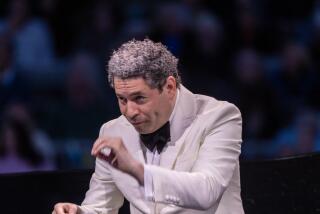So tight, you can’t see Jobim
There were so many things right about the idea behind Wednesday’s tribute to Brazilian composer Antonio Carlos Jobim at the Hollywood Bowl that it was hard to understand how the concert itself could have gone so wrong.
The inclusion of singers Gal Costa, Ivan Lins, Luciana Souza and Eliane Elias, with guitarist Oscar Castro-Neves as musical director, assured a firm foundation of Brazilian authenticity. And Jobim (who died in 1994 at age 67) himself guaranteed the appeal of the music with a catalog that is one of the great song treasures from the last third of the 20th century.
So what was the problem? The failure to recognize those riches by diluting them with too many additional elements and the lack of any visibility for the composer himself other than his songs.
Start with Costa and Lins, two major Brazilian music stars. Each sang a pair of numbers superbly, especially Lins’ rendering of “Dindi” and Costa’s take on “Gabriela.” But to limit these extraordinary Jobim interpreters to a pair of numbers each was an astounding error.
The presence of Jobim’s son Paulo and grandson Daniel on the bill added a familial connection, but both are mediocre interpretive singers. The evening would have been better served by a few video segments of Jobim in action, revealing -- for the unfamiliar -- the charm and charisma of his performing manner.
Finally, although Jobim’s music has been successfully rendered in orchestral settings, the Hollywood Bowl Orchestra (conducted by Nicole Paiement) was at best superfluous, at times distracting (especially in numbers that grounded Lins’ usually free-flying vocals and Elias’ sterling jazz piano work in thick orchestral backgrounds).
In fact, some of the most engaging moments of the evening -- Costa’s “A Felicidade,” Souza’s “Chega de Saudade” and Castro-Neves’ “Aguas de Marco” -- were those with minimal accompaniment, usually featuring the superb guitar work of Romero Lubambo and the versatile woodwinds of Gary Meek.
Also on the bill, rising talent Gretchen Parlato survived large-ensemble backing with a rendering of “Ele e Carioca,” and Marisol Montalvo and Dianne Reeves each added two songs.
More to Read
The biggest entertainment stories
Get our big stories about Hollywood, film, television, music, arts, culture and more right in your inbox as soon as they publish.
You may occasionally receive promotional content from the Los Angeles Times.










